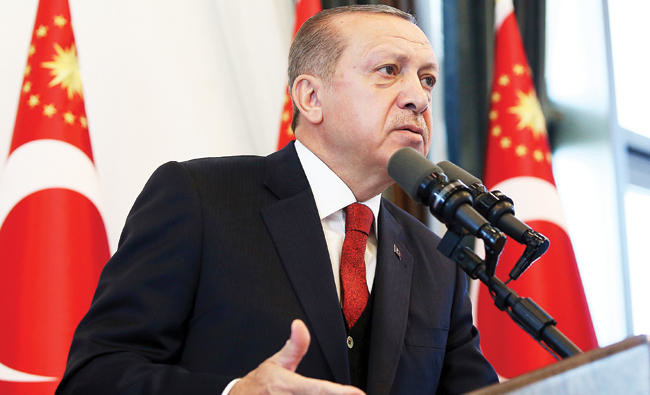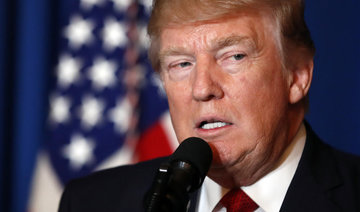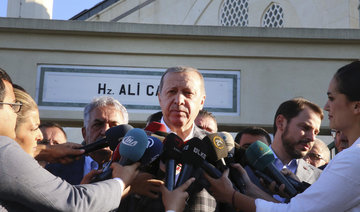ANKARA: Turkish President Recep Tayyip Erdogan has accused the US of mistreating a strategic ally, in a blistering speech which appeared to rule out swift resolution to a dispute between two NATO allies jointly fighting Daesh.
Hours after Ankara announced officials would meet soon to settle differences, Erdogan accused the US consulate in Istanbul of hiding an individual with links to a network he blames for last year’s failed coup.
He also condemned US support for Kurdish fighters in Syria and separate US court cases against a senior Turkish banker and the president’s own security guards, mocking what he said was Washington’s claim to be “the capital of democracy.”
Turkey’s relations with the US and many Western countries have been strained since last year’s failed military coup against Erdogan, in which more than 240 people were killed.
Turkey felt many allies were slow to condemn the coup attempt and failed to appreciate the danger it faced. Western countries have grown alarmed at the scale of Turkey’s post-coup crackdown, with 50,000 people detained and 150,000 suspended from work.
Ties with the US hit a low when Turkey detained a locally employed worker at the US consulate in Istanbul last week.
The US says it is still seeking an explanation for the arrest — the second detention of a consulate worker this year. It suspended most visa services in Turkey, saying it needed to review Turkey’s commitment to the security of its mission and staff. Turkey reciprocated within hours.
US Secretary of State Rex Tillerson spoke with Turkish Foreign Minister Mevlut Cavusoglu on Wednesday and expressed his “profound concern,” the US State Department said.
Erdogan has blamed outgoing US ambassador John Bass, saying he was putting at risk a decades-old alliance.
“Let me be very clear, the person who caused this is the ambassador here. It is unacceptable for the United States to sacrifice a strategic partner to an ambassador who doesn’t know his place,” Erdogan told provincial governors meeting in Ankara.
Turkish grievances
Earlier, Deputy Prime Minister Bekir Bozdag said Turkish and US officials would meet to work on resolving the crisis and described talks between their foreign ministers as constructive.
But Erdogan aired a list of grievances, accusing Washington of sheltering suspected members of the outlawed Kurdish Workers Party (PKK), and supporters of Muslim cleric Fethullah Gulen he blames for last year’s coup attempt. Gulen denies involvement.
“On the one hand you say you are the capital of democracy, but you hide PKK and FETO members,” Erdogan said, using the label his government has given to Gulen’s network.
He said Washington was defending a “FETO-linked person hiding in your consulate,” and said a Christian pastor arrested in western Turkey last year was also “clearly linked” to Gulen.
Ambassador Bass said this week no one was hiding in the US consulate, and that he had seen nothing of merit in the charges against the pastor, Andrew Brunson.
Erdogan said US authorities had wrongly arrested the former head of Turkey’s majority state-owned Halkbank, and were trying to use a detained Turkish gold trader “as an informant.” Both men were arrested on charges of sanctions violations.
Referring to a US grand jury indictment of 15 Turkish security officials who clashed with protesters during his visit to Washington in May, Erdogan said most of them had never set foot on US soil.
“You issue arrest warrants for 13 of my security staff who have never seen the United States,” he said.
“If the ambassador in Ankara is leading the grand United States, then shame on you,” Erdogan said.
“Someone should have said: ‘You cannot treat your strategic partner this way, you can’t behave like this’.”
Close collaboration
Defense Secretary Jim Mattis earlier said US and Turkish military forces continued to work well together amid the diplomatic row.
“We maintain a very close collaboration, very close communication, the military-to-military interaction and integration has not been affected by this,” Mattis told reporters as he traveled to a military headquarters in Florida.
“We are doing good work with them, military to military,” he stressed.
Erdogan says US sacrificing strategic ally Turkey
Erdogan says US sacrificing strategic ally Turkey

No injuries or pollution after explosion at oil tanker off Libya, says operator

ATHENS: An oil tanker carrying about 1 million barrels of crude oil suffered an explosion off Libya on June 27 but no injuries or pollution were reported, a spokesperson for the operator TMS Tankers said on Monday.
The Marshall Islands-flagged tanker Vilamoura had left Libya’s Zuetina port and was en route to Gibraltar when there was an explosion in the engine room, the operator said.
The vessel is now being towed to Greece where it is expected to arrive by July 2, it added.
Israel FM says Golan to ‘remain part of’ Israel in any Syria peace deal

- Golan Heights “will remain part of” Israel under any potential peace agreement with Syria, Israel's FM says
JERUSALEM: Israel’s Foreign Minister Gideon Saar said Monday that the occupied Golan Heights “will remain part of” Israel under any potential peace agreement with Syria.
“In any peace agreement, the Golan will remain part of the State of Israel,” Saar told a news conference in Jerusalem, referring to the territory Israel seized from Syria in 1967 and later annexed in a move not recognized by the United Nations.
Iranian Ambassador: Saudi Arabia Played Key Role in Preventing Escalation

Nearly two years after Iran and Saudi Arabia restored diplomatic relations, Iran’s Ambassador to the Kingdom, Dr. Alireza Enayati, praised Riyadh’s role in reducing tensions and fostering dialogue.
Speaking to Asharq Al-Awsat, Enayati described the progress as “equivalent to achievements that typically take years,” underscoring what he called the “deep roots and substance” of the relationship.
Enayati, who first served in Saudi Arabia as Iran’s consul in Jeddah in 1990 and later as chargé d’affaires in Riyadh, returned in 2023 as ambassador following the March agreement brokered by China to resume ties after seven years of rupture.
Commenting on recent Israeli strikes against Iran, Enayati called the attacks “blatant aggression,” noting that they took place while Tehran was engaged in indirect negotiations with Washington.
“Iran was attacked in the middle of the night, while people slept in their homes. It was our legitimate right under the UN Charter to respond decisively and demonstrate that while Iran does not seek war, it will defend itself with strength and resolve,” he said.
He emphasized that regional reactions to the escalation highlighted a spirit of solidarity.
“The first call our Foreign Minister received was from Saudi Foreign Minister Prince Faisal bin Farhan, condemning the attacks, followed by a statement from the Saudi Foreign Ministry,” he noted. “These positions were crowned by a phone call from His Royal Highness Crown Prince Mohammed bin Salman to President Pezeshkian, expressing condemnation and solidarity, followed by President Pezeshkian’s call back to the Crown Prince and statements of support from several Gulf states.”
Enayati commended Riyadh’s efforts to de-escalate the crisis, describing Saudi Arabia’s role as “honorable” and “blessed.” He added, “In all our bilateral discussions, Iran has acknowledged the Kingdom’s constructive stance and its efforts to prevent further aggression. We welcome any role by our Saudi brothers, especially His Royal Highness Prince Mohammed, who has always stood by us.”
The ambassador pointed to the revival of travel and religious exchange as a sign of rapprochement. “This year alone, over 200,000 Iranians have performed Umrah, and when including Hajj pilgrims, the number exceeds 400,000 visitors to the Kingdom - an extremely positive indicator,” he said.
Enayati also highlighted the recent visit of Saudi Defense Minister Prince Khalid bin Salman to Tehran, describing it as a “historic turning point” that shifted relations from routine to strategic. “The visit and the meetings with President Pezeshkian and the Supreme Leader left a strong impression that we are partners in building regional stability,” he said.
While acknowledging significant progress, Enayati stressed that economic and trade relations still require more effort. “We have agreements on trade, investment, culture, and youth reaffirmed in the Beijing accord,” he said, adding that talks are under way on agreements to avoid double taxation, promote mutual investment, and develop overland transport corridors linking Saudi Arabia and its neighbors to Central Asia.
Responding to criticism that Iran plays a destabilizing role, Enayati said: “We are not outsiders imposing our presence. We are part of the region, its people, and its culture. Differences in political perspectives do not erase our shared bonds. Dialogue is the only path forward, and there is no substitute.”
He concluded by emphasizing that genuine regional security must be anchored in development and economic cooperation rather than military competition. “When security moves beyond weapons and geopolitics to focus on prosperity and shared progress, everyone benefits,” he said.
Israelis attack soldiers in occupied West Bank

- Violence has escalated in the West Bank since the start of the Gaza war
JERUSALEM: Israeli civilians assaulted security forces and vandalized military vehicles and a security installation outside an army base overnight in the occupied West Bank, the military said on Monday.
According to Israeli media, settlers targeted the commander of the Binyamin Regional Brigade base in the central West Bank, calling him a “traitor.”
The officer was among troops attacked on Friday night as they tried to stop settlers entering a closed military zone near the Palestinian village of Kafr Malik. Six civilians were arrested following the clashes.
“Dozens of Israeli civilians gathered at the entrance” of the brigade’s base on Sunday evening, the military said in a statement Monday.
“The gathering became violent and some of the civilians at the scene attacked the security forces, sprayed pepper spray at them, and vandalized military vehicles,” it added.
“The IDF (military), police, and border guards intervened to disperse the gathering,” the statement added, noting one Israeli citizen was injured in the confrontation.
In another statement a few hours later, the army said that “Israeli civilians set fire to and vandalized a security site containing systems that contribute to thwarting terrorist attacks” near the base.
Israeli Foreign Minister Gideon Saar strongly condemned “any violence against the IDF and security forces.”
“Such events are unacceptable, and offenders must be severely punished,” he wrote on X.
“The IDF and security forces work day and night to protect the citizens of Israel and ensure its security. We must support them, not hinder their activities, and under no circumstances attack them,” he added.
Bezalel Smotrich, Israel’s far-right finance minister, a staunch supporter of the settlements who calls for the annexation of the West Bank, also condemned the violence against security forces and the destruction of property, saying a “red line” had been crossed.
In a post on X, he urged the police to investigate the incident and bring those responsible to justice.
Several human rights NGOs have denounced the rise in violence committed by settlers in the West Bank and their perceived impunity.
Violence has escalated in the West Bank since the start of the Gaza war, triggered by the attack by the Palestinian Islamist movement Hamas on Israel on October 7, 2023.
Sudan refugees face deepening hunger as funds dry up: UN

- The WFP warned support to Sudanese refugees in Egypt, Ethiopia, Libya and the Central African Republic “may grind to a halt in the coming months as resources run dry"
KHARTOUM: Millions of people displaced by the war in Sudan are at risk of falling deeper into crisis as funding for food aid dwindles, the UN’s World Food Programme warned Monday.
Since April 2023, war between the Sudanese army and paramilitary Rapid Support Forces has created the world’s largest displacement crisis, with more than 10 million people displaced inside the country.
Another four million have fled across borders, mainly to Chad, Egypt and South Sudan.
“This is a full-blown regional crisis that’s playing out in countries that already have extreme levels of food insecurity and high levels of conflict,” said Shaun Hughes, WFP’s emergency coordinator for the Sudan regional crisis.
The United Nations says its humanitarian response plan for Sudan — also the world’s largest hunger crisis — is only 14.4 percent funded.
A UN conference in Spain this week aims to rally international donors, following deep funding shortfalls that have affected relief operations globally.
The WFP warned support to Sudanese refugees in Egypt, Ethiopia, Libya and the Central African Republic “may grind to a halt in the coming months as resources run dry.”
In Egypt, which hosts around 1.5 million people who fled Sudan, food aid for 85,000 refugees — 36 percent of those previously supported — had already been cut.
Without new funding, the WFP warned, all assistance to the most vulnerable refugees would be suspended by August.
In Chad, where more than 850,000 people have fled but find little help in overwhelmed camps, the WFP said food rations would be reduced even further.
Around 1,000 refugees continue to arrive in Chad each day from Sudan’s western Darfur region, where famine has already been declared and displacement camps regularly come under attack.
“Refugees from Sudan are fleeing for their lives and yet are being met with more hunger, despair, and limited resources on the other side of the border,” said Hughes.
“Food assistance is a lifeline for vulnerable refugee families with nowhere else to turn.”
Inside Sudan, more than eight million people are estimated to be on the brink of famine, with nearly 25 million suffering dire food insecurity.




















